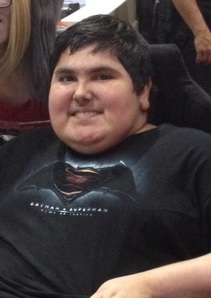
Life with Duchenne is no fun…for anyone, especially for our boys. But, it’s a challenge for caregivers as well. Although I would not change my role as Alex’s caregiver for anything in the world, I’m here to tell you that caring for a boy with Duchenne is no picnic. There are no Bon-Bon’s involved, a good night’s sleep is foreign concept, and you don’t go home at five. Caregiving for Duchenne is performed around the clock. It taxes you emotionally and physically more than you would ever imagine. With Duchenne, you serve the needs of a child who has the brains of an adult and the body of an old man. Day after day after day…night after night after night.
Don’t get me wrong. Caring for Alex is both a privilege and blessing. As many can attest, he is an incredible young man with a heart of gold and a contagious smile.
But,…
It’s the constancy of Duchenne that wears on you. This disease is with you, your son, and your family all day and night, stubborn to leave and at times laughing at your fumbling inability to manage it. Sure, Duchenne may head to the sidelines now and then as life distracts you. You are certain to experience good times when Duchenne seems a distant thought among your family’s treasured moments like vacations, celebrations, or simply enjoying a meal together. But, rest assured, Duchenne is there. Having weaved itself into the fabric of your lifestyle, Duchenne never leaves. Be it lifting, turning, feeding, dressing, grooming, massaging, washing, wiping, giving, fetching, stretching, searching, positioning, explaining, defending, fighting, hoisting, helping,…you name it, Duchenne never lets up. All the while, the bully camps, spreads, and plots its next real estate grab on your son. It’s frustrating on many levels.
Alex gets this, as do many boys and men with Duchenne I’ve come to know. They see Duchenne’s toll upon their caregivers. They see the tired eyes, fatigued bodies, and dragging feet. They hear the occasional edgy voices, heavy sighs, and veiled frustrations. They get it, and wish hard they could do something more to help. However, they often have no choice but to ask. At times, the exchanges can be like pleasant negotiations where both sides willingly and happily meet in the middle. Other times, the conversations collide like two bulls in a china shop where tempers are short and messy and the needs are many and compounding. That’s just the way it is with a disease that never stops and nor cares of the havoc it creates. You just learn to live with it.
With Duchenne, it’s important to understand that as your son’s condition worsens, YOU the caregiver must strengthen mentally and physically. As your son matures, you must find ways to manage his increasing weight and immobility as well as his declining abilities to function and simply breathe. He needs you, and you know it.
It's an evolving awareness. In the early years, you become his legs and carry him often. You boost his confidence as he notices himself falling behind. You show him emotional and social strengths as he transitions to a power wheelchair in stark contrast to his peers. You learn competence with Hoyer lifts and joysticks, as well as ramps and unwieldy accessible vans. You adapt to ignorant and oblivious crowds, inaccessible sidewalks and storefronts, and friends’ inaccessible homes. You shrug off spilled drinks, wet beds, and stained clothes. You comfort him as the number of his visiting friends declines. You display strength, patience, and compassion when he looks to you for answers to life’s hard and difficult questions. You guide him through life’s changes and harsh realities as his Duchenne advances. In the latter stages, you learn the vital importance of cleaning his trachea, suctioning mucus from his lungs, and maintaining his medical equipment. Through it all, you become his confidant, cheerleader, and reliable go-to. You become his dependable ally, strongest fighter, and ultimate role model on how to live. He looks up to you and you cannot let him down.
You learn to do all this because Duchenne never stops. It’s relentless, and so you must be, too. You do it else get bulled over by the unforgiving monster. Duchenne ONLY becomes easier if you keep on grinding and tackle it one day at a time. And then do it again and again and again.
So, for me, I say thank you to my coaches Piper, Thome, and Bickel. Thank you coaches Focht, Tatman, and Beverage, and many others who have molded me through the years. I can still hear your loud, unimpressed, though encouraging, voices pushing me onward to do and be my best. I can only hope those hot, humid, and endless August practices have rooted somewhere deep within me.
I used to think this time of year was all about football. I used to think it was all about the game. But now, when I smell that fresh-cut grass, I know.
It’s about life and how we live it.
This time of year is my reminder to ALWAYS help my son…
…laugh,
…love, and
…live the life he’s dreamed!
Bring it, Duchenne.
 RSS Feed
RSS Feed